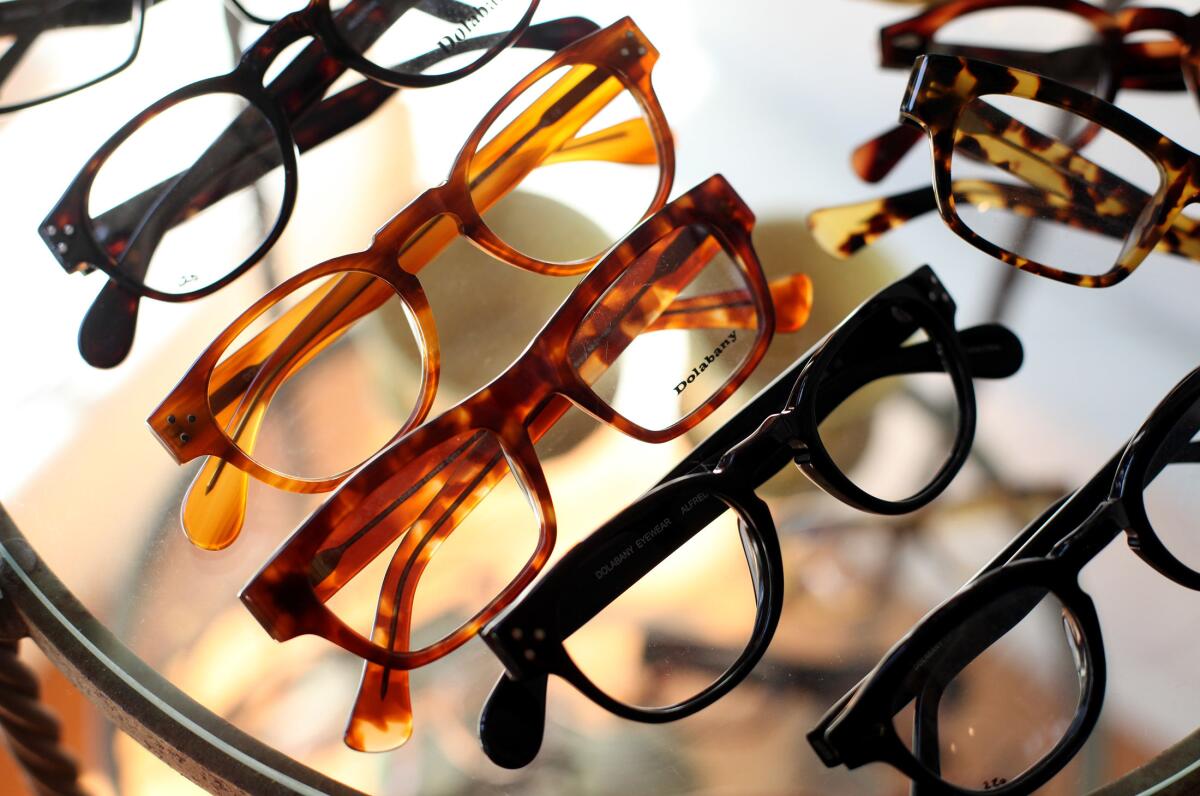Column: Could glasses possibly get more expensive? Yup. A pending deal makes it likely

Incredibly, the company that has near-monopoly control over the eyewear industry may be about to get bigger, this time swallowing the business that owns the For Eyes glasses chain with stores throughout Southern California.
EssilorLuxottica, the world’s largest maker of frames and lenses, owner of LensCrafters and Pearle Vision, is making a play for GrandVision, which has retail outlets nationwide and an even stronger presence in Europe.
The move, first reported by Bloomberg, was confirmed in a statement from HAL Holding, the investment firm that holds a majority share of Netherlands-based GrandVision.
“No agreement has yet been reached and no assurance can be provided that these discussions will lead to such an agreement,” HAL said.
If the deal goes through, it would strengthen EssilorLuxottica’s ability to charge markups of as much as 1,000% for frames and lenses -- market power that comes from controlling all aspects of production, owning the country’s largest chain of glasses stores and operating a major insurance plan.
“They control everything,” said E. Dean Butler, who founded LensCrafters and the insurer EyeMed (the one now owned by EssilorLuxottica). He’s no longer involved with either business and works as an optical-industry consultant.
“This would just give them even more ability to dominate the market,” he told me.
EssilorLuxottica, based in France and Italy, confirmed that buyout talks with GrandVision were underway but said that “no assurance can be provided that these discussions will lead to such an agreement.”
As I’ve previously reported, if you wear designer glasses, it’s likely you’re wearing frames made by EssilorLuxottica. The company’s owned and licensed brands include Armani, Brooks Bros., Burberry, Chanel, Oliver Peoples, Persol, Polo Ralph Lauren and Ray-Ban.
Along with LensCrafters and Pearle Vision, EssilorLuxottica also runs Sears Optical, Sunglass Hut and Target Optical.
GrandVision’s properties worldwide would be a natural fit. The company, operating under a variety of eyewear brands, has more than 7,000 stores in 40 countries.
GrandVision’s For Eyes chain has outlets in Los Angeles, Hawthorne, Long Beach, Huntington Beach, Torrance, Irvine, Oxnard and elsewhere in the state.
As if EssilorLuxottica’s looming expansion wasn’t consumer-unfriendly enough, it comes just weeks after vision insurer VSP Global revealed plans to play the same game.
VSP, by far the largest U.S. vision-benefit provider with nearly 90 million members, said it was purchasing Visionworks, one of the country’s biggest optical chains, with more than 700 stores in 40 states.
The deal will give Rancho Cordova-based VSP all the same elements of market control enjoyed by EssilorLuxottica. VSP already owns Marchon Eyewear, which holds licenses for Calvin Klein, Karl Lagerfeld, LaCoste, Nautica, Nine West, Nike and other brands.
The company began its move into brick-and-mortar retailing by opening several stores in Chicago. Acquiring Visionworks places VSP on a whole new level, potentially turning EssilorLuxottica’s near-monopoly into something more like a duopoly.
Which isn’t much of an improvement, if any, for the optically challenged.
To date, VSP has shown more interest in imitating EssilorLuxottica’s pricing and practices, rather than shaking up the market with genuine competition.
Online eyewear companies, such as Northern California’s Zenni Optical, have been shaking things up by offering frames and lenses at more reasonable prices.
But so far their sales represent only a small piece of the overall market. And buying glasses online, without trying them on first, is still a difficult concept for many people to accept.
A German company called SuperVista recognizes this, and thinks it has the secret sauce to beat EssilorLuxottica and VSP at their own game.
Matthias Kampetter, the company’s chief executive, was in L.A. this week laying the groundwork for the Sept. 1 U.S. debut of SuperVista’s Brillen Eyewear. Its business model is the opposite of what the online guys are attempting.
Kourosh Zakeri, SuperVista’s director of U.S. operations, told me you won’t be able to buy Brillen glasses online. The idea is to partner with local optometrists and enhance the value of the brick-and-mortar experience.
“We do that by offering glasses at a fraction of the cost of other glasses, while at the same time providing exceptional quality,” Zakeri said.
The price points are impressive. When Brillen eyewear becomes available locally in coming weeks, the cost of complete single-vision glasses -- frame and lenses -- will start at $59. Complete progressive glasses will start at $129.
These prices are about half what you’d pay at Warby Parker. If the quality is anywhere near the Warby level (and this is German engineering we’re talking about), this is potentially a big deal.
And like Warby Parker, which provides free or discounted glasses to people in need, Brillen has a do-gooding side.
Zakeri couldn’t divulge details, but he said a discount (possibly 20%) will be offered to customers who bring in old glasses that can be donated to people who can’t afford new specs.
SuperVista has more than 1,000 optical partnerships in Europe. Zakeri declined to name local firms that will be part of the U.S. Brillen network, but he said about 200 shops across the country should be participating as of the Sept. 1 launch.
Speaking of Warby Parker, I keep hearing rumors that it could be the next company to be gobbled up by EssilorLuxottica. That makes sense.
Warby Parker comes with the brick-and-mortar retail component that EssilorLuxottica cherishes. It also brings some millennial-cool cachet to any product lineup.
Privately held Warby Parker is currently valued at more than $1 billion and says it became profitable last year.
I asked a Warby spokeswoman to comment on the acquisition rumors. No answer.
The only thing that seems sure at this point is the big eyewear players will keep getting bigger, creating headaches for consumers but also opportunities for businesses that recognize you don’t need to base an entire industry on ripping people off.
Online glasses companies offer a chance for savings, but the learning curve can be steep for consumers in getting the hang of things.
If Brillens come as advertised -- yeah, sign me up.
David Lazarus’ column runs Tuesdays and Fridays. He also can be seen daily on KTLA-TV Channel 5 and followed on Twitter @Davidlaz. Send your tips or feedback to david.lazarus@latimes.com.







